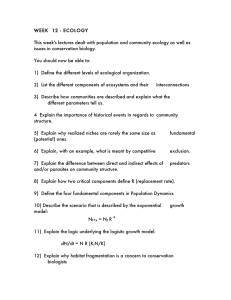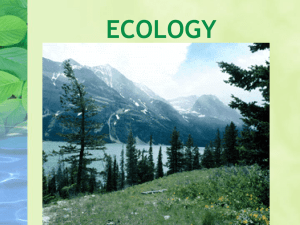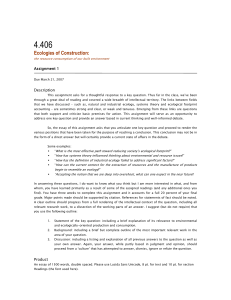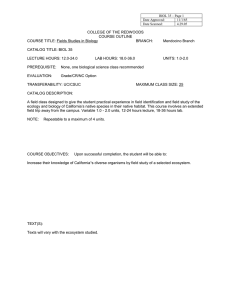El Paso Community College Syllabus Part II
advertisement
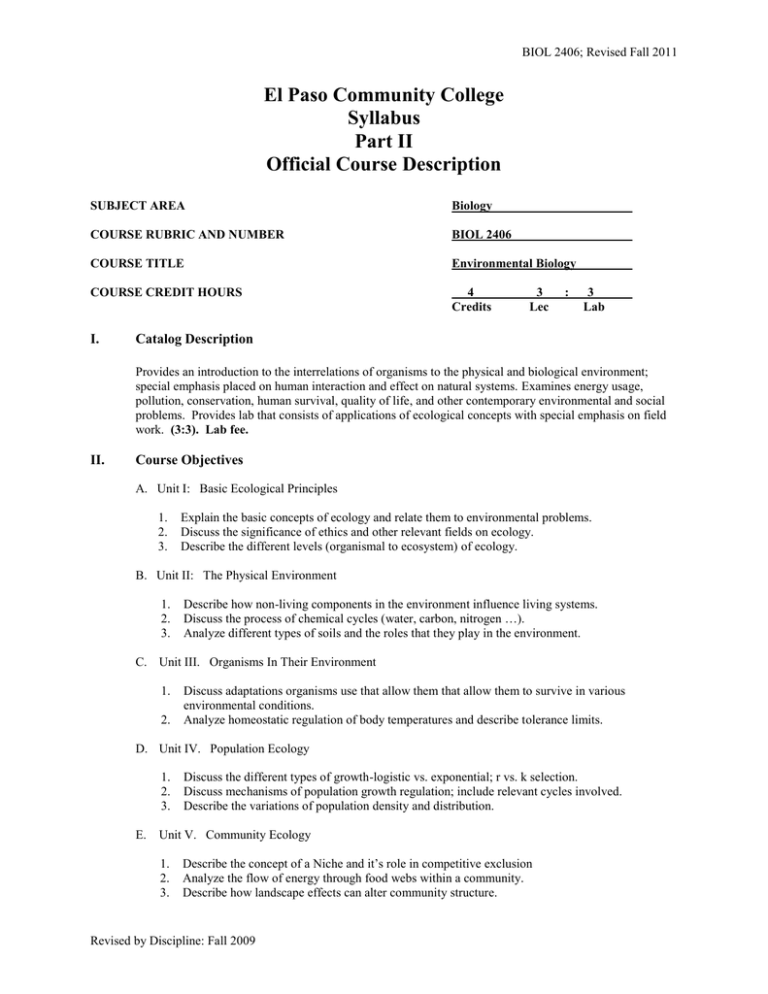
BIOL 2406; Revised Fall 2011 El Paso Community College Syllabus Part II Official Course Description SUBJECT AREA Biology COURSE RUBRIC AND NUMBER BIOL 2406 COURSE TITLE Environmental Biology COURSE CREDIT HOURS 4 Credits I. 3 Lec : 3 Lab Catalog Description Provides an introduction to the interrelations of organisms to the physical and biological environment; special emphasis placed on human interaction and effect on natural systems. Examines energy usage, pollution, conservation, human survival, quality of life, and other contemporary environmental and social problems. Provides lab that consists of applications of ecological concepts with special emphasis on field work. (3:3). Lab fee. II. Course Objectives A. Unit I: Basic Ecological Principles 1. 2. 3. Explain the basic concepts of ecology and relate them to environmental problems. Discuss the significance of ethics and other relevant fields on ecology. Describe the different levels (organismal to ecosystem) of ecology. B. Unit II: The Physical Environment 1. 2. 3. Describe how non-living components in the environment influence living systems. Discuss the process of chemical cycles (water, carbon, nitrogen …). Analyze different types of soils and the roles that they play in the environment. C. Unit III. Organisms In Their Environment 1. 2. Discuss adaptations organisms use that allow them that allow them to survive in various environmental conditions. Analyze homeostatic regulation of body temperatures and describe tolerance limits. D. Unit IV. Population Ecology 1. 2. 3. E. Discuss the different types of growth-logistic vs. exponential; r vs. k selection. Discuss mechanisms of population growth regulation; include relevant cycles involved. Describe the variations of population density and distribution. Unit V. Community Ecology 1. 2. 3. Describe the concept of a Niche and it’s role in competitive exclusion Analyze the flow of energy through food webs within a community. Describe how landscape effects can alter community structure. Revised by Discipline: Fall 2009 BIOL 2406; Revised Fall 2011 F. Unit VI. Ecosystem Ecology 1. 2. Describe the physical characteristics of major terrestrial biomes. Analyze the biogeographical processes the produce these biomes. G. Unit VII. Human Effects on the Environment 1. 2. 3. 4. 5. 6. Describe sustainable uses of natural resources. Examine examples of natural resource overexploitation. Discuss the effect exotic species have on natural systems. Discuss pollution (air, water, solid …) and its effect on the environment. Describe specific examples of human intervention in natural systems; discuss the outcomes. Examine political and economic philosophy on environmental decisions. H. Unit VIII. Conservation Biology 1. 2. 3. 4. III. Discuss the importance of biodiversity. Examine past and current rates of species extinctions. Describe the efforts of conservation organizations (national parks, zoos, aquaria, botanical gardens… ). Examine and predict trends for the future using ecological models. Evaluation A. Pre-assessment: Not Required B. Post-assessment 1. Lecture ( 75% of total grade); exams, projects, and presentations will be used to evaluate the students progress. The student’s written expression (objective/essay combination) will be emphasized. 2. Lab (25% of total grade); relevant laboratory and experiences will be used to evaluate students progress. C. Grading Scale 90-100 80-89 70-79 60-69 Below 60 IV. = = = = = A B C D F Disability Statement (American with/Disabilities Act [ADA]) EPCC offers a variety of services to persons with documented sensory, mental, physical, or temporary disabling conditions to promote success in classes. If you have a disability and believe you may need services, you are encouraged to contact the Center for Students with Disabilities to discuss your needs with a counselor. All discussions and documentation are kept confidential. Offices located: VV Rm C-112 (831-2426); TM Rm 1400 (831-5808); RG Rm B-201 (831-4198); NWC Rm M-54 (831-8815); and MDP Rm A-125 (831-7024) V. 6 Drop Rule Students who began attending Texas public institutions of higher education for the first time during the Fall 2007 semester or later are subject to a 6-Drop limit for all undergraduate classes. Developmental, ESL, Dual Credit and Early College High School classes are exempt from this rule. All students should consult with their instructor before dropping a class. Academic assistance is available. Students are encouraged to see Counseling Services if dropping because exemptions may apply. Refer to the EPCC catalog and website for additional information. Revised by Discipline: Fall 2009

